- Home
- »
- Advanced Interior Materials
- »
-
Nanomaterials Market Size, Share And Growth Report, 2030GVR Report cover
![Nanomaterials Market Size, Share & Trends Report]()
Nanomaterials Market (2024 - 2030) Size, Share & Trends Analysis Report By Material (Gold, Silver, Iron, Copper), By Application (Aerospace, Automotive, Medical), By Region, And Segment Forecasts
- Report ID: GVR-4-68038-565-6
- Number of Report Pages: 135
- Format: PDF
- Historical Range: 2018 - 2022
- Forecast Period: 2024 - 2030
- Industry: Advanced Materials
- Report Summary
- Table of Contents
- Segmentation
- Methodology
- Download FREE Sample
-
Download Sample Report
Nanomaterials Market Summary
The global nanomaterials market size was estimated at USD 12.42 billion in 2023 and is projected to reach USD 32.77 billion by 2030, growing at a CAGR of 15.0% from 2024 to 2030. The market is expected to be driven by increasing demand for the product in electronic applications owing to its increased surface area at the time of application coupled with its high superparamagnetic properties.
Key Market Trends & Insights
- The Asia Pacific nanomaterials market dominated the market with revenue share of 38.5% in 2023.
- The nanomaterials market in India is growing at fastest CAGR of 19.0% over the forecast period of 2024 to 2030.
- Based on application, the medical application segment accounted for a major share of around 31.2% of the global revenue in 2023.
- Based on material, the titanium nanoparticles segment accounted for a significant market share in 2023.
Market Size & Forecast
- 2023 Market Size: USD 12.42 Billion
- 2030 Projected Market Size: USD 32.77 Billion
- CAGR (2024-2030): 15.0%
- Asia Pacific: Largest market in 2023
The application of nanomaterials is also increasing in the medical industry on account of the utilization of products in various in-vitro and in-vivo application. The rising investment by various research laboratories and biomedical industries for increasing product penetration in targeted drug delivery, gene therapy, and treatment of malignant tumors is expected to boost the market growth.The production of nanomaterials requires varying raw materials depending on the manufacturing processes applied. Such raw materials include metals, rare earth metals, alloys, polymers, and composites that are either supplied to commercial manufacturers or research laboratories. AppliChem GmbH and Bernd Kraft GmbH are among the major suppliers in the market that provide the required raw materials.
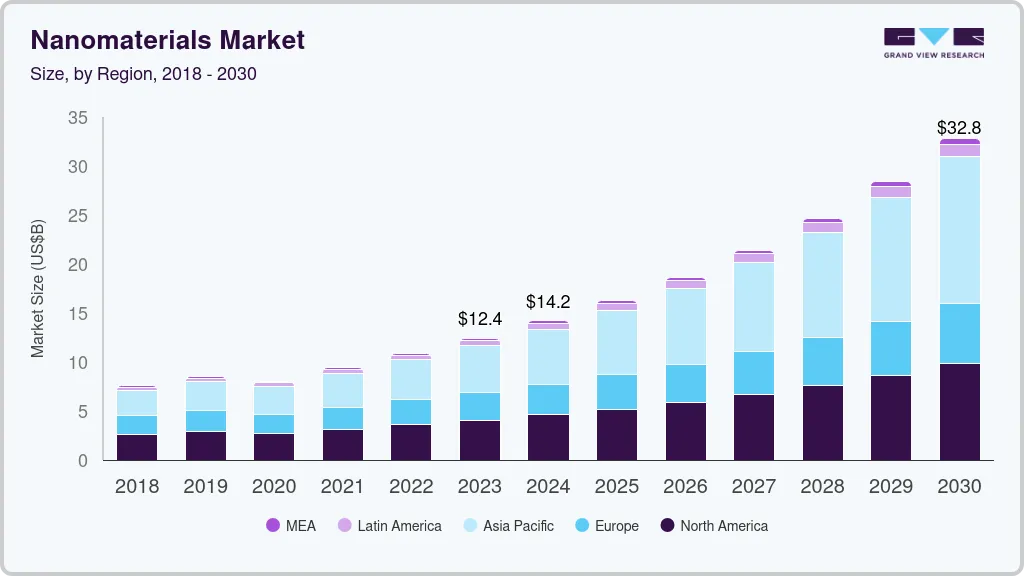
Stringent regulations in North America and Europe are projected to hinder the growth in these regions. Regulatory authorities such as the Food and Drug Administration, the U.S. Environmental Protection Agency, and the Health and Consumer Protection Directorate are investigating the potentially harmful impacts of nanoparticles on the environment and human health.
A wide range of thermochemical methods is used to synthesize nanoparticles, which can be categorized as either surfactant or polymer-assisted precipitation reactions or co-precipitation reactions. Major methods used for the synthesis of nanoparticles include co-precipitation, reverse micelle, copolymer template, and ion exchange resin.
Market Concentration & Characteristics
The market growth stage is high, and the pace of growth is accelerating. The degree of innovation is moderate, as several nanomaterial companies are continuously engaged in R&D activities and the implementation of new technologies to gain a competitive advantage and serve various application requirements.
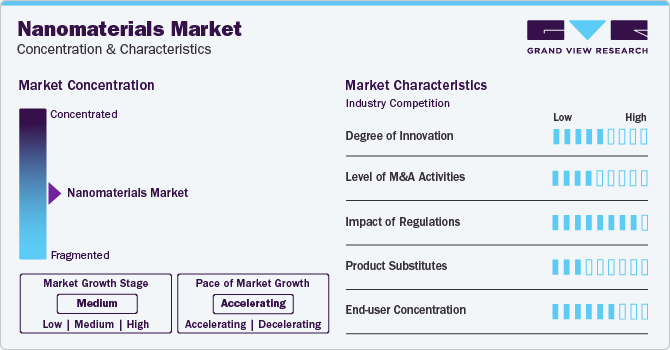
The nanomaterials materials market is considered highly competitive on account of the presence of many large-scale manufacturers. Key players operating in the market include Strem Chemicals, Inc., Sigma Aldrich Inc., American Elements, US Research Nanomaterials, Inc., Nanoshel LLC, and Nanocomposix Inc. Manufacturers provide products on the basis of standard specifications and design specifications provided by the end users.
There are currently no federal or state laws governing nanomaterials in the U.S. Currently, nanomaterials are governed by the existing regulatory framework for chemical, pesticide, food, cosmetic, and pharmaceutical products. A few of the primary regulatory bodies involved are the Environmental Protection Agency (EPA) and the Food and Drug Administration (FDA), thus leading to a high impact of regulations.
The product itself is used as a substitute for conventional products, such as gadolinium in magnetic resonance imaging (MRI) as a contrast agent. The properties of nanoparticles are considerably superior as compared to those of conventional products as they do not have any adverse health effects if used in various biomedical applications.
Material Insights
Titanium nanoparticles accounted for a significant market share in 2023 and are expected to grow at the fastest CAGR of 16.3% over the forecast period. The product is expected to witness increased demand on account of its ability to inhibit bacterial growth and prevent of formulation of further cell structure.
Furthermore, titanium (Ti) nanomaterials have a high strength-to-weight ratio, corrosion resistance, and biological compatibility. Hence, they are widely used in aerospace, chemicals, medical, petrochemicals, and architectural industries. These nanomaterials also exhibit excellent UV radiation resistance, biocompatibility, corrosion resistance, and mechanical strength.
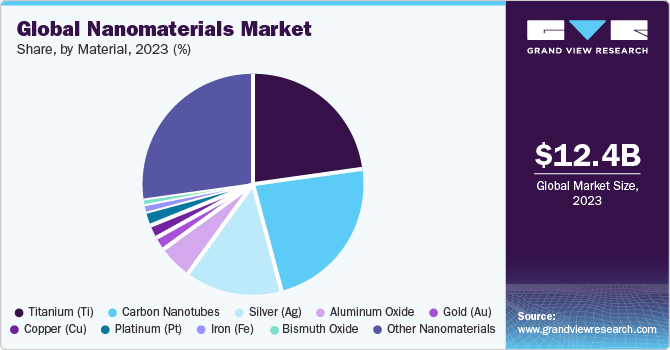
Antimony tin oxide (ATO) nanomaterials are expected to grow at a CAGR of 15.7% over the forecast period. The product is exclusively used as essential components in display panels in the electronics sector owing to their anti-static properties, transparent conductivity, and infrared absorbance.
Gold nanomaterials offer optical and electronic characteristics that are being explored widely for use in high-tech applications such as sensory probes, electronic conductors, and therapeutic agents. They are also expected to be used in organic photovoltaics and for drug delivery in biological and medical applications, this is expected to increase the demand for gold nanomaterials over the forecast period.
Application Insights
The medical application segment accounted for a major share of around 31.2% of the global revenue in 2023 on account of the high penetration of the product for use in the treatment of cancer and other malignant tumors. Furthermore, nanomaterials are used for various specific tasks in medical sector including imaging, targeted drug delivery, nanorobots for surgery, nano diagnostics, cell repair, and nano biosensors.
In addition, the product is expected to witness high demand due to its usage as a T2 contract agent in MRIs owing to its superparamagnetic behavior at room temperature. Moreover, nanoparticles are also used as gene carriers for gene therapy as well as in the body detoxification processes.
The aerospace application segment is expected to grow at a CAGR of 12.2% over the forecast period. Rising demand for lighter and more efficient aircraft has driven the rapid adoption of nanomaterials in aircraft manufacturing. Nanomaterials are being used on a large scale in aerospace parts manufacturing including aerostructure, glass, and textile to improve the safety, comfort, and affordability of an aircraft.
Furthermore, the high-strength and lightweight properties offered by nanomaterials as well as the fast operating speed provided by nanoelectronics, are expected to increase their penetration in aerospace applications. In addition, nanostructured metals not only exhibit improved properties but can be engineered to display certain properties that are uncharacteristic of conventionally sized materials.
Regional Insights
North America nanomaterials market accounted with a revenue share of 32.7% in 2023 on account of the growing penetration of products in various application industries. Furthermore, continuous efforts in the R&D of nanomaterials and nanotechnology, to explore further potential applications in various end-use industries, are expected to drive the regional market over the forecast period.
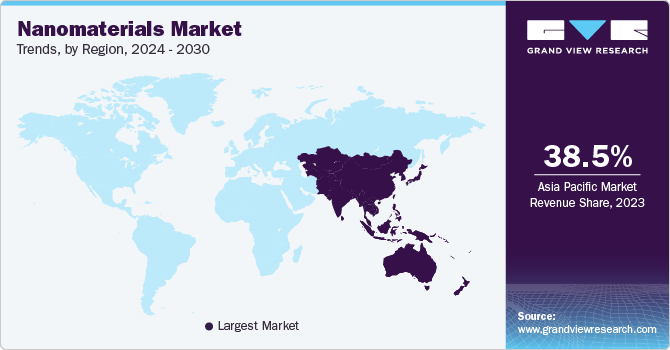
U.S. Nanomaterials Market Trends
The U.S. government invests heavily in nanotechnology through the National Nanotechnology Initiative (NNI)-an R&D initiative of the U.S. government. NNI has estimated that more than 20,000 researchers are involved in the R&D and application development of nanomaterials, thereby driving the U.S. nanomaterial market.
Asia Pacific Nanomaterials Market Trends
The Asia Pacific nanomaterials market dominated the market with revenue share of 38.5% in 2023 on account of the growing semiconductor manufacturing industry coupled with rising product penetration. Furthermore, the substantial growth of electronics, medical equipment, aerospace & defense, textiles, and automotive industries in the region is expected to fuel the product demand.
The nanomaterials market in India is growing at fastest CAGR of 19.0% over the forecast period of 2024 to 2030. Nanomaterial is one possible means of bridging the gap between India’s abundant, varied natural resources and ever-increasing needs such as medical, electronics, hygienic water and food, and high-quality textiles.
China nanomaterials market is anticipated to witness the fastest growth due to increasing investments in research and development activities for biomedical, electronics, energy, and wastewater treatment applications.
Europe Nanomaterials Market Trends
The rising demand for renewable energy, coupled with the high penetration of nanomaterials in storing electricity generated from renewable energy sources, is expected to have a positive impact on the growth of nanomaterials market in Europe over the forecast period.
The UK nanomaterials market has expertise in designing integrated circuits, optoelectronics, and radiofrequency devices such as monolithic microwave integrated circuits and other electronic components. Hence, increasing growth opportunities for the country's electronics sector are expected to positively affect the growth of the nanomaterials market in the UK over the forecast period.
The nanomaterials market in Germany is promoting consistent harnessing of added value potential offered by nanotechnology to strengthen the position of the country as a hub for innovations and technologies. Such support and new strategies by the Government of Germany are expected to fuel the growth of the nanomaterials market in the country during the forecast period.
Central & South America Nanomaterials Market Trends
Central & South America nanomaterials market is growing at a CAGR of 14.2% from 2024 to 2030. Several countries in Central & South America have adopted and undertaken national nanotechnology strategies and initiatives to support the industries and companies working on nanotechnology, which in turn, is expected to increase demand for nanomaterials in the region.
The nanomaterial market in Brazil is increasing owing to the number of institutes focused on nanotechnology research in the country. For instance, Rede de Nanotecnologia Molecular e de Interfaces (RENAMI) is a network of 17 institutions that carries out the development of nanostructured materials, interfaces, and devices for molecular nanotechnology.
Middle East & Africa Nanomaterials Market Trends
In the Middle East and Africa, several government organizations are investing in the development and production of nanomaterials. For instance, Saudi Arabia has an international research center dedicated to nanomanufacturing technology, ajoint venture between the King Abdulaziz City of Science and Technology (KACST) and the U.S.-based Intel Corporation.
Key Nanomaterials Company Insights
Some of the key players operating in the market include Strem, American Elements, and Nanophase Technologies Corporation.
-
Strem is engaged in the production and distribution of high-purity specialty chemicals. It manufactures nanoparticles using a wide range of materials such as aluminum, nickel, iron, carbon, cadmium, calcium, gold, silicon, tin, zinc, and silver. It provides products to the government, manufacturing industries, and academic development & research laboratories.
-
Nanophase Technologies Corporation manufactures and supplies a wide range of engineered and advanced materials. It offers several customer-proprietary formulations through its global network of manufacturing facilities. The products manufactured by the company are used in a wide range of applications including energy, aerospace, automotive, defense, and pharmaceutical or medical.
nanoComposix, Cytodiagnostics Inc. and Quantum Materials Corporation are some of the emerging market participants in the nanomaterials market.
-
nanoComposix is a manufacturer of highly characterized and precisely engineered nanoparticles. It provides un-agglomerated and monodisperse metal & metal oxide nanoparticles. It also produces custom nanomaterials, from core/shell particles to bio-functionalized, fluorescent, and magnetic nanocomposites to meet individual client specifications. It provides customized products by modifying standard products based on customer requirements.
-
Cytodiagnostics Inc. is engaged in manufacturing and supplying nanotechnology-based products and services for product development and life science research. It also provides customized services such as custom assay developments, conjugation of proteins & antibodies to nanoparticles, conjugation of oligonucleotides to nanoparticles, and analytical services.
Key Nanomaterials Companies:
The following are the leading companies in the nanomaterials market. These companies collectively hold the largest market share and dictate industry trends.
- Strem
- American Elements
- US Research Nanomaterials, Inc.
- nanoComposix
- Frontier Carbon Solutions, LLC.
- Nanoshel LLC
- SkySpring Nanomaterials, Inc.
- Nanophase Technologies Corporation
- Cytodiagnostics Inc
- Quantum Materials Corporation
Recent Developments
-
In December 2023, California NanoSystems Institute at University of California, Los Angeles (UCLA) launched the nanoparticles made with six medium-entropy alloy nanoparticles combined nickel, palladium, and platinum. The material is used for medium- and high-entropy alloys essential components of buildings, transportation, appliances, tools, and electronic devices.
-
In April 2021, NanoComposix improved the development of its process for scaling up the 40 nm gold citrate particles for use in lateral flow diagnostic assays. This capability can increase production to at least 100 L at 20 OD, allowing for the production of 30-50 million lateral flow strips per month.
Nanomaterials Market Report Scope
Report Attribute
Details
Market size value in 2024
USD 14.20 billion
Revenue forecast in 2030
USD 32.77 billion
Growth rate
CAGR of 15.0% from 2024 to 2030
Base year for estimation
2023
Historical data
2018 - 2022
Forecast period
2024 - 2030
Quantitative units
Revenue in USD million/billion and CAGR from 2024 to 2030
Report coverage
Revenue forecast, company ranking, competitive landscape, growth factors, and trends
Segments covered
Material, application, region
Regional scope
North America; Europe; Asia Pacific; Central & South America; Middle East & Africa
Country scope
U.S.; Canada; Mexico; UK; Germany; France; China; India; Japan; Brazil
Key companies profiled
Strem; American Elements; US Research Nanomaterials, Inc.; nanoComposix; Frontier Carbon Solutions, LLC.; Nanoshel LLC; SkySpring Nanomaterials, Inc.; Nanophase Technologies Corporation; Cytodiagnostics Inc; Quantum Materials Corporation
Customization scope
Free report customization (equivalent up to 8 analysts’ working days) with purchase. Addition or alteration to country, regional & segment scope.
Pricing and purchase options
Avail customized purchase options to meet your exact research needs. Explore purchase options
Global Nanomaterials Market Report Segmentation
This report forecasts revenue growth at global, regional, and country levels and provides an analysis of the latest industry trends in each of the sub-segments from 2018 to 2030. For this study, Grand View Research has segmented the global nanomaterials market report based on material, application, and region.
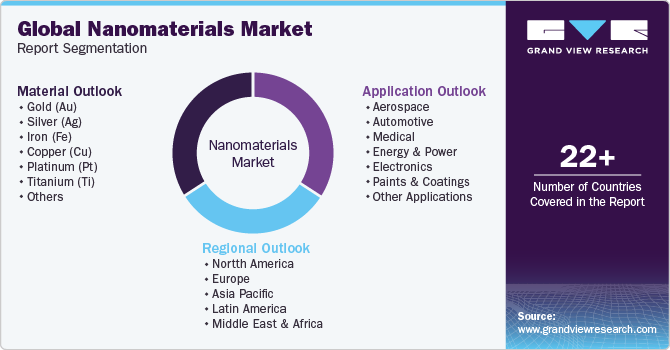
-
Material Outlook (Revenue, USD Million, 2018 - 2030)
-
Gold (Au)
-
Silver (Ag)
-
Iron (Fe)
-
Copper (Cu)
-
Platinum (Pt)
-
Titanium (Ti)
-
Nickel (Ni)
-
Aluminum Oxide
-
Antimony Tin Oxide
-
Bismuth Oxide
-
Carbon Nanotubes
-
Other Nanomaterials
-
-
Application Outlook (Revenue, USD Million, 2018 - 2030)
-
Aerospace
-
Automotive
-
Medical
-
Energy & Power
-
Electronics
-
Paints & Coatings
-
Other Applications
-
-
Regional Outlook (Revenue, USD Million, 2018 - 2030)
-
North America
-
U.S.
-
Canada
-
Mexico
-
-
Europe
-
Germany
-
UK
-
France
-
-
Asia Pacific
-
China
-
Japan
-
India
-
-
Central & South America
-
Brazil
-
-
Middle East & Africa
-
Frequently Asked Questions About This Report
b. The global nanomaterials market size was estimated at USD 12.42 billion in 2023 and is expected to reach USD 14.20 billion in 2024.
b. The nanomaterials market is expected to grow at a compound annual growth rate of 15.0% from 2024 to 2030 to reach USD 32.77 billion by 2030.
b. Based on material, the carbon nanotubes segment dominated the market and was valued at USD 2.87 billion in 2023 on account of its increasing application in electronics & semiconductor and structural composite segments owing to their lightweight, thermal and electrical conductivity.
b. Some of the key players operating in the nanomaterials market include Strem American Elements, US Research Nanomaterials, Inc., nanoComposix, Frontier Carbon Solutions, LLC, and Nanoshel LLC
b. The key factors that are driving the nanomaterials include rapidly growing usage of product in rising product penetration in the biomedical industry as well as applications such as cosmetics, electronics, healthcare, defense, agriculture, and energy.
Share this report with your colleague or friend.
Need a Tailored Report?
Customize this report to your needs — add regions, segments, or data points, with 20% free customization.

ISO 9001:2015 & 27001:2022 Certified
We are GDPR and CCPA compliant! Your transaction & personal information is safe and secure. For more details, please read our privacy policy.
Trusted market insights - try a free sample
See how our reports are structured and why industry leaders rely on Grand View Research. Get a free sample or ask us to tailor this report to your needs.










